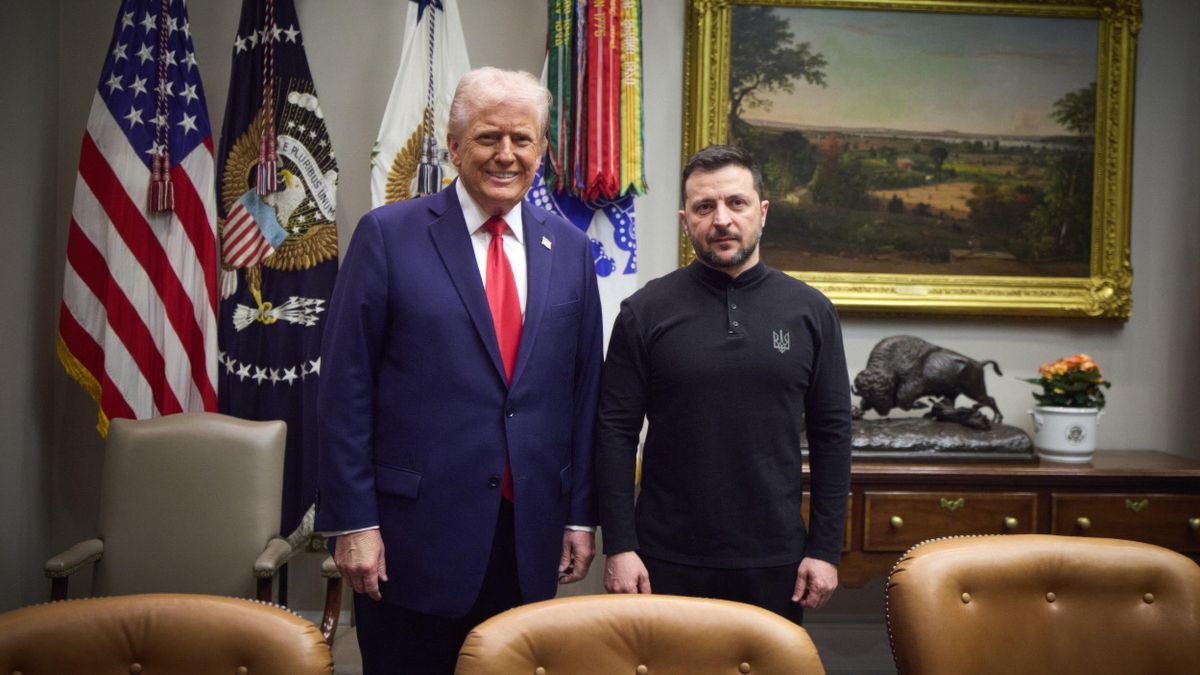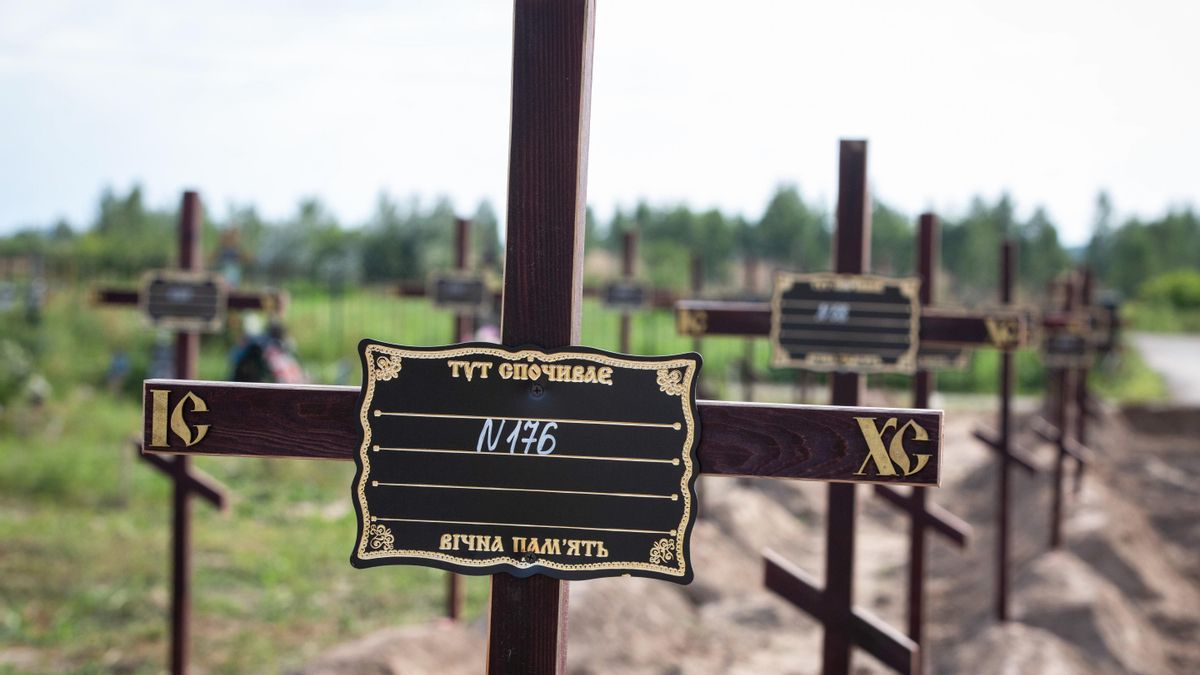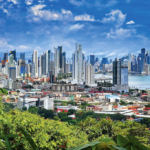
Donald Trump and Vladimir Putin gather this Friday in Alaska, at the Joint base elmendorf-richardson, to discuss how to end the war in Ukraine in a meeting that ten days ago seemed unthinkable. Before the visit of the White House emissary, Steve Witkoff, to Moscow, on August 6, Kremlin’s intransigence before the American president’s ultimatum so that Russia stopped the fighting approached more than ever the possibility of rupture between Trump and Putin.
The surprise announcement of the appointment was a script turn that they did not expect in Moscow, where the land was already prepared for new sanctions; nor in kyiv, where they believed that the efforts of recent months to drag Trump towards his positions had been successful; nor in most European capitals, where, suddenly, they were seen sections of the negotiation process.
The first clues Trump has given about the content of the meeting make Volodimir Zelenski a catastrophic result. In the best of the scenarios for Ukraine, the meeting can be a new triumph of Kremlin when it comes to dilating peace conversations and continuing to advance in the front. In the worst, kyiv can be forced to accept unassumable fire conditions, agreed behind them.
Territorial exchanges
“There will be some exchanges, land changes.” These were Trump’s words that put Zelenski on alert. It is unknown what this exchange of territories would consist and, in fact, according to the Wall Street Journal, Witkoff gave contradictory versions of what he had discussed with Putin.
European officials assured the newspaper that, on a first call, Trump’s envoy said Russia would be willing to withdraw from the provinces of Zaporiyia and Jersón in exchange for the total control of Donetsk. Later, he clarified that Putin could accept a high fire if the Ukrainian army left Donetsk. And finally, he changed the interpretation and explained that the Russian leader wanted to freeze the front line in his current situation.
None of these three scenarios agree with the recent statements of Putin, which has always claimed the withdrawal of kyiv’s troops from the four territories that was annexed in the Constitution (Luhansk, Donetsk, Jersón and Zaporiyia), even the parties that Moscow still does not control.
At the end of April, Witkoff already flew to Russia with a proposal that involved the freezing of the front line in exchange for hostilities and that also offered Putin the recognition of Russian sovereignty about Crimea or the non -adhesion of Ukraine to NATO. Already then the Kremlin rejected it.
Russia asks more than territories
In addition, Putin himself has reiterated that his demands for peace go far beyond the territorial issue. Russia also asks for the disarmament of Ukraine, its neutrality and (very important) the dismissal of Zelenski with the ultimate goal of establishing a proruso government in kyiv.
The political scientist Serguéi Markov, close to the Kremlin, wrote in Telegram: “All media write about fierce disputes over territories, but during all this time Russia has said that it does not fight for the territories, but to change the neo -fascist and rusophobic character of the Ukrainian regime.”
Zelenski does not want to give up
“The answer to the Ukrainian territorial issue is already in the Constitution of Ukraine. The Ukrainians will not give away their land to the occupant,” Zelenski said this week. “The territorial issue cannot be separated from security guarantees,” he added.
The resistance of the Ukrainian leader to assume the loss of territories has several times to Trump in the past months. The last, this week, when he complained that Zelenski had objected that he needed constitutional approval to give land. “It has approval to go to war and kill everyone, but needs it to make an exchange of territories,” said the US president from the White House.

According to the Daily Telegraph, the Ukrainian president would only contemplate the hostilities and give up part of their territories if the entry of Ukraine to NATO and the supply of Western weapons will be guaranteed. An option that seems equally rejectable for Putin.
From kyiv, they insist on the priority of a high fire. The Zelenski Cabinet Chief, Mikhail Podoliak, has declared the Corriere Della, a truce in air attacks could be a starting point for broader peace negotiations. However, Nor Putin wants to talk about high fire if it is not after agreeing a solution to the conflict under its terms.
What can expect?
Given the rigidity of the Kremlin, in Washington it has already been taken for granted that the end of the war will not be agreed at the meeting. Trump described the meeting as a “feel-out meeting”that is, an appointment to explore at what extent each part and that can serve as a preamble of a future meeting (the Russian government has already offered to host the following). The spokeswoman for the American administration, Karoline Leavitt, described the summit as “an listening exercise.”
Nor in Moscow await draft agreements. For Putin, it is already an unpublished diplomatic victory: the first face to face between an American president and a Russian one since the beginning of the invasion and, in addition, the first time that Putin Pisa Pisa North American territory in ten years. In short, a return through the big door to the table of world powers that decide global fate.
To date, its negotiating strategy has been based on gaining time based on rejecting the proposals of Washington and kyiv. This Friday’s appointment will constitute a success for the Kremlin if he is able to place Trump to a next summit to continue discussing the end of the war and, meanwhile, to conquer new territories.
Trump insists on the Putin-Zelenski meeting
However, Trump’s haste to close the conflict, even if he is false, adds uncertainty to the meeting. The Kremlin could use the White House Ansia to force Zelenski to reject the Russian -American proposal. In this way, Putin calculates, the US president would understand that it is Ukraine who wishes to continue the war and abandon mediation.
Trump’s intention is to maintain a second meeting shortly after the first, “if it goes well”, which has the presence of Putin and Zelenski, with the aim of expediting the resolution of hostilities.
This is an unlikely scenario, no matter how much the American leader wishes, because the Russian leader is not willing to sit with his Ukrainian counterpart. He considers him illegitimate and questions if he can be the ideal person to sign a peace agreement, even if it were surrender.
Zelenski has already been warning: “Putin does not prepare to finish the war, but for new offensive. He only wants to pass the meeting as a victory and continue to press Ukraine.”
Ukraine suffers in the front
The Summit in Alaska arrives at an unbeatable moment for Russia in the front. This week there has been one of the most prominent advances in Moscow troops in recent months.
According to Deepstate military analysts, Russian soldiers managed to break the defensive lines of the Ukrainian army in Donetsk, capturing parts of the corridor that connects Dobropilia with Kramorsk, a key route for the supply of weapons and kyiv’s logistics movement, which Russia has been trying for months.
![Brigade soldiers number 238 of artillery of the Tuntal forces group [Centro] Russia in Donetsk](https://static.eldiario.es/clip/4c53b5db-060b-49fb-8411-8bf5c0088ef7_16-9-discover-aspect-ratio_default_0.jpg)
Maksim Zhorin, an important figure of the Ukrainian Azov movement and commander of an assault brigade, says on Telegram that the collapse of the front line can lead to the loss of the entire Donetsk region and points to the situation is far from being under control.
Putin will try to use these advances to convince Trump of his advantage on the battlefield and the inevitability of Russian victory.
In recent days, the American president has once again demonstrated that he is very receptive to Russian propaganda. During a recent press conference, he said that Moscow would have been able to reach kyiv in four hours, at the beginning of the invasion, if a general had not decided to cross Ukraine through fields instead of the road, ignoring that the resistance of the Ukrainian army was crucial to stop the Russian tanks.
Europe, marginalized
Trump held a “very good conversation” on Wednesday, according to his words, with Zelenski and European and NATO leaders. Europe fears that its supplications to win the favor of Trump and that it did not interrupt military support to Ukraine could be useless if at the meeting a course is taken contrary to the interests of kyiv and Brussels.
The fear of the unpredictability of the White House leader is such that, as The Telegraph publishes, the United Kingdom has asked Emmanuel Macron and Friederich Merz to not irritate Trump and be definitively excluded from the peace process.
In the days before the summit, the Russian press has dedicated itself to highlighting the marginal role of Europe in the negotiations on Ukraine. Even from the environment of the Russian leader, the allies of Ukraine have been accused of wanting to orchestrate attacks by false flag to derail the Russ American meeting.
One of the Russian negotiators, the head of the Sovereign Fund, Kirill Dmitriev, wrote in Telegram: “Without a doubt, there will be countries interested in continuing the conflict that will make titanic efforts (provocations and misinformation) to prevent the encounter.”
Russian propaganda states that the Russian slaughter of civilians in the city of Bucha in 2022 was a scene mounted by Western secret services to stop the incipient negotiation process in Istanbul.

The common interest in the Arctic
Dmitriev has been Russia’s friendliest face during the negotiation process with the United States. He was the first Kremlin representative to visit the White House since the invasion of Ukraine and has always defended the possibilities of cooperation between the two countries.
One of the issues that will be addressed at the meeting will be the Arctic. This region contains up to 13% of oil and 30% of natural gas not discovered in the world, according to the US Geological Survey, it has strategic minerals such as nickel and cobalt, in addition to being progressively becoming a maritime route with the thaw of the poles.
It is a matter of vital importance for each other, also from the point of view of security and offers a route for Russia and the United States to explore joint businesses and reach agreements outside Ukraine.
Source: www.eldiario.es

